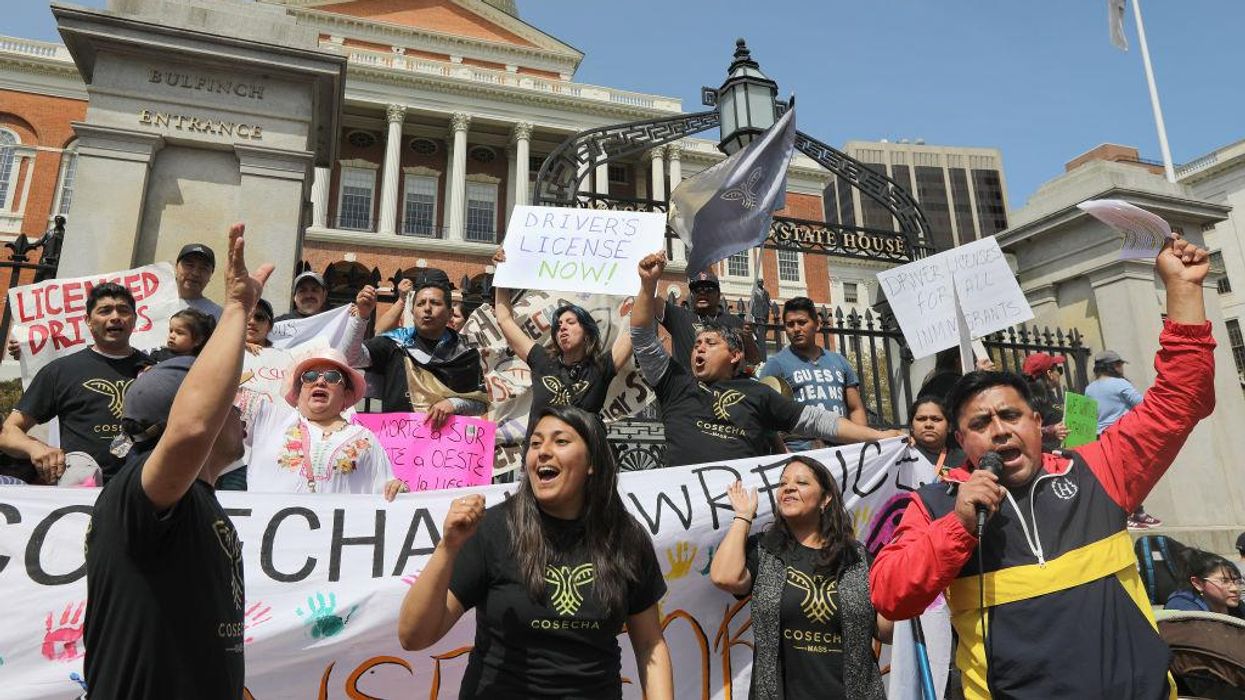
Photo by Pat Greenhouse/The Boston Globe via Getty Images

On February 16, the Democrat-controlled Massachusetts House of Representatives overrode Republican Gov. Charlie Baker's veto and approved a bill called the Work and Family Mobility Act. The bill would enable illegal aliens to acquire driver's licenses. The state Senate, similarly Democrat-controlled, signed H.4805 into law on May 5, making Massachusetts the 17th state to confer licenses on criminal non-citizens.
Although touted by some advocates as a step towards "transformational change for undocumented immigrants across the Commonwealth," that step might amount to a stumble.
In the upcoming November election, the people of Massachusetts have an opportunity to repeal the law.
As the result of an energetic campaign and a petition allegedly netting over 100,000 signatures — of which only 71,883 signatures were ultimately accepted — Massachusetts' Election Division certified the proposed referendum as Question 4 on the November 8 ballot. Only 40,120 signatures were required.
The work to get the question of whether to keep or repeal the new license law on the ballot began in earnest in June, when Maureen Maloney and Kevin Dube filed a statement of organization with the Massachusetts Office of Campaign and Political Finance to create the Fair and Secure Massachusetts committee.
As the committee made considerable progress collecting signatures into the summer, some Democrats took notice. The Federation for American Immigration Reform reported that Senate President Karen Spilka (D) saw the ballot question's passage not only as possible but as "a concern."
In a September 9 statement, Maloney, chairman of the committee, said of the petition's success, "Making the ballot is a huge achievement, and to do it with such an excess of signatures shows the groundswell of support across the commonwealth for repealing this law."
Maloney's son Matthew was brutally killed by an illegal alien, who struck him with a truck and dragged his body in 2011. In 2019, Maloney first testified against the bill in the state House before its passage and was met with jeers and boos.
Advocates for the bill suggested, "In the Trump era, immigrant families risk being torn apart every time they drive," citing instances where illegal aliens were deported after being charged with traffic offenses.
Maloney indicated in 2019 that the rhetoric about illegal aliens being separated from their families didn't sit well with her, given that "I have been permanently separated. This is the ultimate separation. ... They're afraid they'll be deported, but they can take their kids with them or their kids can go visit them. I don't have that option."
Boston 25 reported that Maloney and others involved with the repeal campaign were not only concerned that the law would enable foreign nationals in the United States illegally to take to the roads and endanger the lives of citizens. They were also worried that the law may undermine the integrity of state elections by providing illegal aliens with a means to vote.
Although the law specifies that the state is required to ensure that people without legal residences are not automatically registered to vote along with everyone else who receives a driver's license, some believe there will nevertheless be considerable abuse.
Governor Baker argued, when issuing his veto, that the bill "significantly increases the risk that noncitizens will be registered to vote." He added that the bill "restricts the Registry's ability to share citizenship information with those entities responsible for ensuring that only citizens register for and in our elections."
Republican gubernatorial nominee Geoff Diehl and Leah Allen, Republican nominee for lieutenant governor, announced their support for the ballot question in June, similarly arguing that this law will "threaten the integrity of our elections."
In the bill's initial hearings, another concern was raised: the well-being of economically vulnerable citizens.
According to the Massachusetts Coalition for Immigration Reform, the provision of licenses to illegal aliens legitimizes illegal competition. "A whopping 200,000 illegal aliens already reside in Massachusetts — up one-third from a decade ago — taking jobs that would otherwise go to lawful residents, and driving down the wages of low-skilled residents who are still working, because of an oversupply of any resource reduces its value."
The MCIR also noted that not only does the issuing of licenses to illegal immigrants serve to sanction criminality, but it facilitates the use of services intended for citizens by non-citizens.
A poll conducted in April by Suffolk University indicated that the vote may be a toss-up, with 46.13% supporting licenses for illegal aliens, 46.63% opposed, and 55% undecided.
Unless the law is blocked by citizen voters in November, illegal aliens can begin applying for licenses on July 1, 2023.